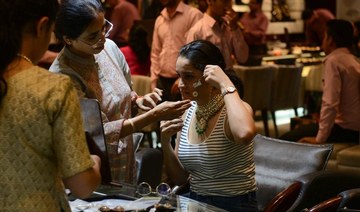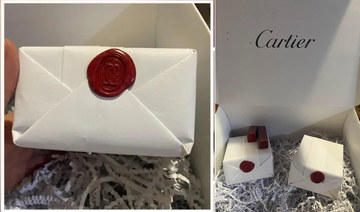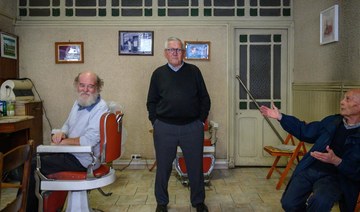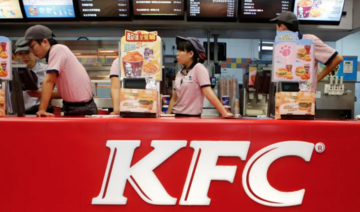PARIS: Forget how many carats — how ethical is your gold? As high-end consumers demand to know the origin of their treasures, some jewellers are ensuring they use responsibly sourced, eco-friendly or recycled gold.
Specialized producers now tack a “fairmined” ecologically friendly label on their output, and the Swiss house Chopard last year became the first big name to commit to “100 percent ethical” creations.
The Geneva-based firm, which makes the Palme d’Or trophy for the Cannes Film Festival, says it now uses only verified suppliers of gold that meet strict standards to minimize negative environmental impacts of mining the precious metal.
Among the many certificates and standards claiming to codify “responsible” goldmining, two labels stand out.
They are “fairmined” gold — a label certified by a Colombian NGO — and the more widely known “fairtrade” label launched by Swiss foundation Max Havelaar.
Both support artisanal mines that seek to preserve the environment in terms of extraction methods, along with decent working conditions and wages for the miners.
Such production remains limited — just a few hundred kilograms annually. Global gold output by comparison totals around 3,300 tons.
Concerned jewellers are keen to ensure they can trace the source of their entire supply to an ethical production cycle and to firms certified by the not-for-profit Responsible Jewellery Council, which has developed norms for the entire supply chain.
RJC members must adhere to tough standards governing ethical, human rights, social and environmental practices across the precious metals industry.
The French luxury group Kering, which says it has bought more than 3.5 tons of “responsibly produced” gold since 2015 for its Boucheron, Pomellato, Dodo and Gucci brands, has committed to 100 percent use of “ethical” gold by 2020.
“We are trying to maximize the proportion of Fairmined and Fairtrade gold — but their modest production is in great demand so the bulk of our sourcing remains recycled gold, (which is) certified ‘RJC Chain of Custody’,” says Claire Piroddi, sustainability manager for Kering’s jewelry and watches.
Fairmined or Fairtrade gold is “about 10 to 12 percent more expensive. But recycled gold barely generates any additional cost premium,” Piroddi told AFP, since it was already refined for a previous life in the form of jewelry or part of a high-tech product.
Going a step further, using only precious metal from electronic or industrial waste is an original idea developed by Courbet, a brand launched just last spring.
“We do not want to promote mining extraction or use recently extracted gold, so we sought suppliers who recycle gold used in graphics cards or computer processors. That’s because we know today that more than half of gold’s available reserves have already been extracted,” says Marie-Ann Wachtmeister, Courbet’s co-founder and artistic director.
She says the brand’s watchwords are ethical and environmental consciousness.
“In a mine, a ton of terrain might contain five grams of gold, whereas a ton of electronic waste might generate 200 grams,” Wachtmeister says.
“Clients are also demanding an ecological approach more and more — they are aware of their day-to-day impact and consider the origin of what they wear,” she adds.
“The issue of supply really resonates with the public at large,” adds Thierry Lemaire, director general of Ponce, a jewelry firm that was established in Paris’s fashionable Marais district in 1886.
The company is RJC-certified and uses only recycled gold.
“There is a logic to that — if we want to do our work well, then let’s go the whole hog and respect nature. That can be done today because the entire chain has become standardised.
“Studios such as ours that work for major names on Place Vendome are all certified,” Lemaire says, referring to an upscale square in Paris.
He represents the fifth generation of family firm Ponce, which produces 45,000 gold rings a year from recycled gold.
Working in a pungent atmosphere of heated metal, refiners sit hunched over polishing machines, a large leather hide slung over their knees to catch the tiniest shaving.
“Every Friday, we have a great clearout and go over the workshop with a fine-tooth comb to pick up little bits of (gold) dust and shavings,” Lemaire says.
“Nothing is lost, it’s a truly virtuous chain.”
The ethical gold rush: Gilded age for guilt-free jewelry
The ethical gold rush: Gilded age for guilt-free jewelry
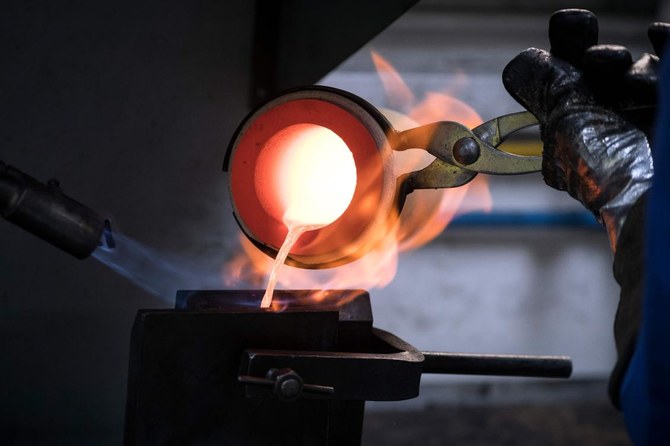
- Specialized producers now tack a “fairmined” ecologically friendly label on their output
- Swiss house Chopard last year became the first big name to commit to “100 percent ethical” creations
Palestinian prisoner in Israel wins top fiction prize

- The mask in the novel’s title refers to the blue identity card that Nur, an archaeologist living in a refugee camp in Ramallah, finds in the pocket of an old coat belonging to an Israeli
ABU DHABI: Palestinian writer Basim Khandaqji, jailed 20 years ago in Israel, won a prestigious prize for Arabic fiction on Sunday for his novel “A Mask, the Color of the Sky.”
The award of the 2024 International Prize for Arabic Fiction was announced at a ceremony in Abu Dhabi.
The prize was accepted on Khandaqji’s behalf by Rana Idriss, owner of Dar Al-Adab, the book’s Lebanon-based publisher.
Khandaqji was born in the Israeli-occupied West Bank city of Nablus in 1983, and wrote short stories until his arrest in 2004 at the age of 21.
He was convicted and jailed on charges relating to a deadly bombing in Tel Aviv, and completed his university education from inside jail via the Internet.
The mask in the novel’s title refers to the blue identity card that Nur, an archaeologist living in a refugee camp in Ramallah, finds in the pocket of an old coat belonging to an Israeli.
Khandaqji’s book was chosen from 133 works submitted to the competition.
Nabil Suleiman, who chaired the jury, said the novel “dissects a complex, bitter reality of family fragmentation, displacement, genocide, and racism.”
Since being jailed Khandaqji has written poetry collections including “Rituals of the First Time” and “The Breath of a Nocturnal Poem.”
He has also written three earlier novels.
Mexican doctor claims victory in $28 Cartier earrings battle
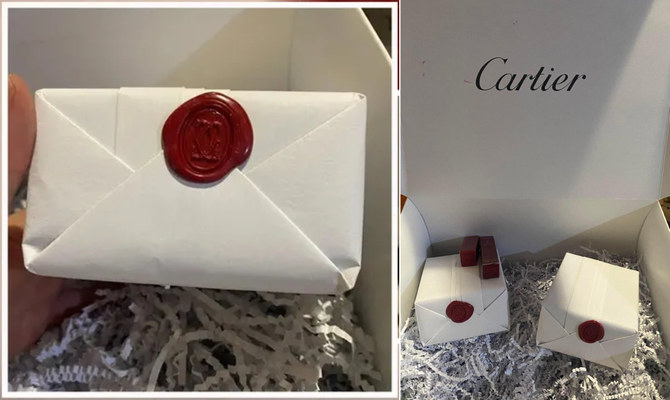
MEXICO CITY: A Mexican man has claimed a victory over French luxury brand Cartier, saying an error allowed him to buy two pairs of earrings for $28 that were supposed to cost nearly $28,000.
After a four-month struggle, doctor Rogelio Villarreal said he had finally received the jewelry, which he accused the company of refusing to deliver after his online purchase in December.
According to Villarreal, he came across the low-priced earrings while browsing Instagram.
“I swear I broke out in a cold sweat,” he wrote on the social media platform X.
Cartier declined to recognize the purchase and offered Villarreal a refund, as well as a bottle of champagne and a passport holder as compensation, according to a company letter shared by the doctor.
But Villarreal refused and decided to take the case to Mexico’s consumer protection agency, which ruled in favor of the doctor.
Cartier accepted the decision, Villarreal announced.
“War is over. Cartier is complying,” he wrote.
French barber still trimming at 90
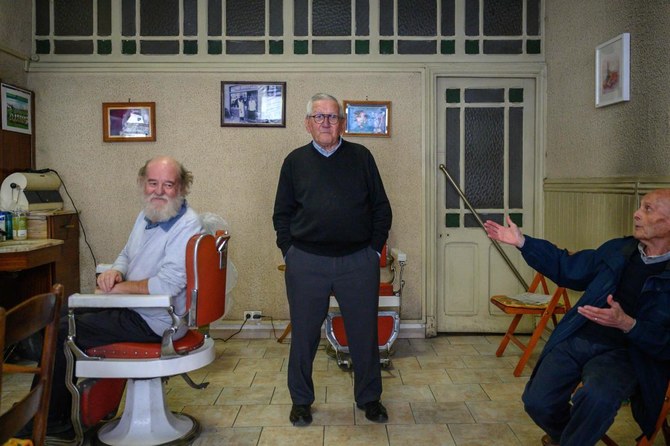
- “I love this job, it’s in my bones,” he said
- Even with arthritis, he is on his feet from Tuesday to Saturday, tending to his customers’ hair and beards in his shop in the small southern town of Saint-Girons
SAINT-GIRONS, France: French barber Roger Amilhastre, 90, could have hung up his clippers decades ago but he said his passion for hair gives him a reason to get up in the morning.
“I love this job, it’s in my bones,” he said, leaning on one of his cast-iron barber’s chairs from the 1940s.
“And despite my age, my hands still don’t shake.”
Even with arthritis, he is on his feet from Tuesday to Saturday, tending to his customers’ hair and beards in his shop in the small southern town of Saint-Girons in the foothills of the Pyrenees.
“I would have liked to retire at 60, but my wife was sick and I needed to pay for the care home,” he said, which cost more than 2,000 euros ($2,150) a month.
Even after his wife died in January, he kept going to work to stave off the sad thoughts.
“I’m not grumpy getting up” to go to work, he said.
France’s national hairdressers’ union believes Amilhastre may be France’s oldest active barber.
“We have a few who continue late in life, but 90 years old is exceptional,” union president Christophe Dore told AFP.
“I’m not sure if he is France’s oldest barber, but if not, he can’t be far off,” he added.
According to the national statistics institute INSEE, a little more than half a million people over 65 still work in France.
In the southern region of Occitanie, where Amilhastre lives, only 1.65 percent of people older than 70 years old still work, including 190 79-year-olds. But statistics do not go beyond that age.
Many of Amilhastre’s customers call him Achille, after his father who founded the barber’s shop in 1932, giving it his name and then teaching his son the profession.
The shop witnessed the German occupation of France during World War II.
“During the war, German police came to find my father to groom a captain who had broken his leg,” Amilhastre said.
German troops had taken over a large stately home in town called Beauregard.
“We were scared because they used to say that anyone who went up to Beauregard never came back,” he said.
“Luckily he did.”
The 90-year-old said he remembered a “tough period” for businesses when he first picked up the scissors in 1947 a few years after the war ended.
But then the town rebounded, he said, with its men following a flurry of new hair trends from greased back quiffs in the 1950s to 1970s bowl cuts.
The barber’s shop survived an economic downturn as local paper mills closed in the 1980s sparking mass layoffs, and supermarkets pushed small shops out of business.
“People started looking for work further afield, so we had to adapt and stay open later in the evening,” Amilhastre said.
That same decade, the AIDS epidemic sent customers into a worried frenzy.
“People were scared. They no longer asked to be shaved and when we did, we were petrified there’d be a cut, that someone would bleed and the virus would be passed on to the next customer,” he said.
Jean-Louis Surre, 67, runs the nearby cafe where Amilhastre once taught him to play billiards as a young boy.
Behind his bar, Surre said he still remembered his mother taking him across the road to see Amilhastre for a haircut every month as a child.
“He’d pump up the chair to reach the mirror, use his clippers and then at the end perfume you with some cologne — you know, squeezing those little pumps,” he said.
He is one of several old-timers to regularly drop by Achille’s — even just to read the newspaper or have a chat.
Inside the barber’s, Jean Laffitte, a balding 84-year-old, said he no longer really needed a haircut.
“With what little is left up there, these days I come out of friendship,” he said.
China’s Shenzhou-18 mission docks with space station

- The astronauts took off from the Jiuquan Satellite Launch Center in China’s northwest at 8:59 p.m. local time Thursday
- The astronauts will stay at the Tiangong space station for six months, carrying out experiments
JIUQUAN, China: A spaceship carrying three astronauts from China’s Shenzhou-18 mission safely docked at Tiangong space station Friday, state-run media reported, the latest step in Beijing’s space program that aims to send astronauts to the Moon by 2030.
The crew took off in a capsule atop a Long March-2F rocket from the Jiuquan Satellite Launch Center in China’s northwest at 8:59 p.m. local time 1259 GMT) Thursday.
By early Friday the spacecraft had “successfully docked” with the space station, state-run news agency Xinhua reported, citing the China Manned Space Agency.
The mission is led by Ye Guangfu, a fighter pilot and astronaut who was previously part of the Shenzhou-13 crew in 2021.
He is joined by astronauts Li Cong and Li Guangsu, who are heading into space for the first time.

Onlookers cheered as the rocket blasted off into the night sky, an AFP journalist at the scene said.
Xinhua said the launch had been declared a “complete success.”
The astronauts will stay at the Tiangong space station for six months.
There they plan to carry out experiments “in the fields of basic physics in microgravity, space material science, space life science, space medicine and space technology,” the China Manned Space Agency has said.
They will also try and create an aquarium onboard and seek to raise fish in zero gravity, according to Xinhua.
“Not only will the taikonauts find joy in the space ‘aquarium,’ but it may also pave the way for their future counterparts to enjoy nutritious fish from their own in-orbit harvests,” it added.

They will also conduct experiments on “fruit flies and mice,” a researcher quoted by the agency said.
The new crew will replace the Shenzhou-17 team, who were sent to the station in October.
Plans for China’s “space dream” have been put into overdrive under President Xi Jinping.
The world’s second-largest economy has pumped billions of dollars into its military-run space program in an effort to catch up with the United States and Russia.
Beijing also aims to send a crewed mission to the Moon by 2030, and plans to build a base on the lunar surface.
China has been effectively excluded from the International Space Station since 2011, when the United States banned NASA from engaging with the country — pushing Beijing to develop its own orbital outpost.
That station is the Tiangong, which means “heavenly palace” — the crown jewel of a space program that has landed robotic rovers on Mars and the Moon, and made China the third country to independently put humans in orbit.
It is constantly crewed by rotating teams of three astronauts, with construction completed in 2022.
The Tiangong is expected to remain in low Earth orbit at between 400 and 450 kilometers (250 and 280 miles) above the planet for at least 10 years.
Algeria’s first KFC restaurant reopens without logo following Gaza protests
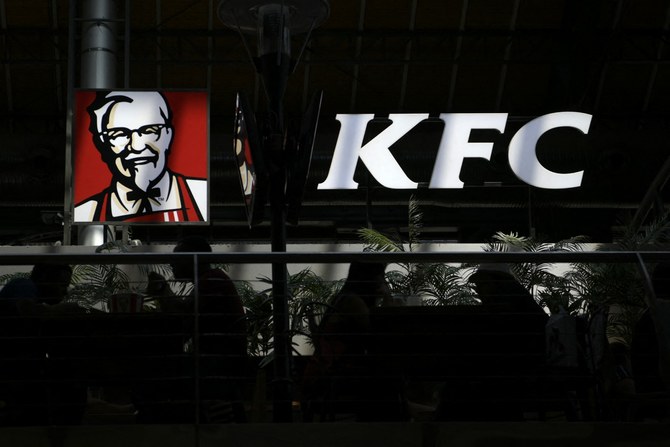
- Protesters gathered outside outlet last week in solidarity with Palestinians
- KFC parent company Yum! Brands has faced backlash for its ties with Israel
LONDON: Algeria’s first Kentucky Fried Chicken outlet has resumed operations after a temporary closure prompted by a series of pro-Palestinian demonstrations last week.
However, the restaurant, situated in the Algiers suburb of Dely Ibrahim, reopened its doors without the familiar Col. Sanders logo on its exterior.
It remains unclear if the outlet has had a change of ownership or remains under the umbrella of Yum! Brands, the parent company of KFC.
Demonstrators gathered outside the eatery on April 16, calling for a boycott and expressing solidarity with Palestinians amid the Gaza conflict.
Protesters draped in Palestinian flags voiced support for “Palestinian martyrs” while obstructing access to the storefront.
The restaurant has faced a backlash due to its perceived ties to Israel, with Yum! Brands having made investments in Israeli startups, including TicTuk, a company that allows customers to order food on social networks and message apps, and Dragontail, a system software company specializing in food processing.
In response, the Boycott, Divestment, Sanctions movement designated KFC’s sister company, Pizza Hut, as an “organic boycott target,” due to the “brands’ complicity in Israel’s genocide and apartheid against Palestinians.”
بعد أيام من افتتاح فرعها الأول، KFC الجزائر تزيل شعار علامتها وتُغلق أبوابها!
— أحمد داود (@AhmadDaoud14) April 17, 2024
منذ افتتاحها تعالت أصوات مقاطعتها، ووقفات احتجاجية أمامها، واستنكارٌ لمنح الترخيص لوكيلها! #الجزائر
pic.twitter.com/rIaOG80xTi
While the temporary closure of the KFC outlet was hailed as a success by demonstrators, its reopening sparked disappointment among some Algerians.
The incident underscores challenges and employment ramifications stemming from boycotts related to the Gaza conflict.
Since the start of the war, regional franchises of McDonald’s, one of the key boycotted brands, have distanced themselves from the parent company, arguing that they are 100 percent local.
The opening of a KFC branch in Algeria was noteworthy given the nation’s historical aversion to Western food chains, as well as its stringent foreign investment regulations, which typically prohibit the establishment of foreign food or beverage franchises.
Previous efforts to establish outlets without official approval, such as the brief appearance of a counterfeit “Starbucks,” have been met with swift action and closure.





